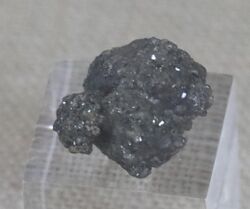Chemistry:Ordoñezite
From HandWiki
| Ordóñezite | |
|---|---|
 | |
| General | |
| Category | Antimonate mineral |
| Formula (repeating unit) | ZnSb2O6 |
| Strunz classification | 4.DB.10 |
| Crystal system | Tetragonal |
| Crystal class | Ditetragonal dipyramidal (4/mmm) H-M symbol: (4/m 2/m 2/m) |
| Space group | P42/mnm |
| Unit cell | a = 4.66 Å, c = 9.26 Å; Z = 2 |
| Identification | |
| Color | Very light to very dark brown, colorless to pearl-gray, light yellowish olive to dark olive |
| Crystal habit | Pyramidal crystals in drusy or stalactitic masses |
| Twinning | Common on {013} |
| Fracture | Conchoidal |
| Mohs scale hardness | 6.5 |
| |re|er}} | Adamantine |
| Diaphaneity | Semitransparent |
| Specific gravity | 6.635 |
| Optical properties | Uniaxial (+) |
| Refractive index | N(calculated) = 2.02 - 2.04 |
| References | [1][2][3][4] |
Ordoñezite or ordóñezite is a rare tetragonal zinc antimonate mineral with chemical formula: ZnSb2O6.
Discovery
Ordóñezite was first discovered and documented by Ezequiel Ordóñez (1867-1950), a Mexican geologist, formerly director of the Geological Institute of Mexico. It was first described in 1953 for an occurrence with cassiterite in veins in rhyolite in the Santín mine which is located about eight kilometres from Santa Catarina, Guanajuato, Mexico.[2] Another locality is El Antimonio, 27 km (17 mi) southwest of Agua Prieta, Sonora, Mexico.[3]
Properties
Optical properties include: semitransparent, very light to very dark colorless to pearl-gray, light yellowish olive to dark olive.
References
- ↑ Mineralienatlas
- ↑ 2.0 2.1 Mindat.org
- ↑ 3.0 3.1 Handbook of Mineralogy
- ↑ Webmineral data
- ↑ Warr, L.N. (2021). "IMA–CNMNC approved mineral symbols". Mineralogical Magazine 85 (3): 291–320. doi:10.1180/mgm.2021.43. Bibcode: 2021MinM...85..291W.
External links
 |

